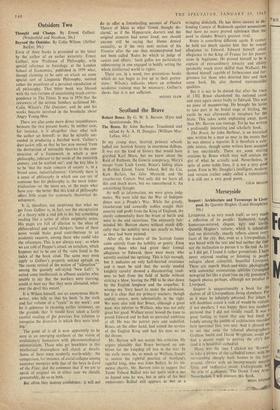Scotland the Brave
IN my young days, Scottish primary schools ladled out Scottish history in enormous dollops. It was not the kind of history that would have gratified Karl Marx, but we knew about the Raid of Ruthven, the Gowrie conspiracy, Mary's escape from Loch Leven, Bruce's hiding place in Rathlin Island, Toom Tabard, Bell the Cat, Kate Barlass, the false Menteith and the treacherous Comyn. Not only did we learn all this and much more, but we remembered it. An astonishing thought.
As well as information, we were given judg- ments. We were told that the War of Indepen- dence was a and War. While the greedy, treacherous and cowardly nobles sought their security and profit from the King of England, the sturdy commonalty bore the brunt of battle and were in the end victorious. The eminently fair- minded Mr. Barrow shows without much diffi- culty that the nobility were not nearly as black as they had been painted.
After all, the leaders of the Scottish forces came entirely from the nobility or gentry. Even among those who had given their formal allegiance to Edward, there were many who secretly assisted the uprising. This is fair enough, but it indicates an only half-hearted resistance and it must be said that the sorely needed knightly cavalry showed a disconcerting readi- ness to bolt from the field of battle without striking a blow, leaving the PBI to be shot down by the English longbow and the arquebus. It wrongs my Tory heart to make the admission, but it is clear that my primary teachers, though unduly severe, were substantially in the right.
We were also told that Bruce, although a great man, was inferior to Wallace, who was not only great but good. Wallace never bowed the knee to prood Edward and he had no personal ambition at all. He was the patriot pure and undefiled.
Bruce, on the other hand, had joined the service of the English King and had his eyes set on the throne.
Mr. Barrow will not accept this criticism. He argues plausibly that Bruce betrayed no am- bition for the kingship till late in the war. In the early years, he, as much as Wallace, fought to restore the rightful position of Scotland's rightful king, who was John Balliol. In his im- mense charity, Mr. Barrow tries to suggest that Toom Tabard Balliol was not quite such a wet as legend says he was, but in spite of his best endeavours Balliol still appears as wet as a
wringing dishcloth. He has more success in de- fending Comyn of Badenoch against accusations that have no more proved substance than the need to slander Bruce's greatest rival.
Bruce is something different again. It cannot be held too much against him that he vowed allegiance to Edward. Edward himself owed allegiance to the King of France for his posses- sions in Aquitaine. He proved himself to be a captain of extraordinary tenacity and ability (probably much more skilful than Wallace). He showed himself capable of forbearance and for- giveness for those who deserted him and then came back. He also showed statesmanlike qualities.
But it is not to be denied that after the truce of 1302 Bruce abandoned the national cause and once again swore fealty to Edward. This was no piece of manoeuvring. He brought his levies to take part in the brutal siege of Stirling, the castle he was afterwards to recapture for the Scots. This takes some explaining away, more than Mr. Barrow can manage. Yet he has written a profoundly interesting and scholarly book. The Bruce, by John Barbour, is an historical epic written by a man so near to the events that he was almost a reporter. It is therefore a valu- able source, though some writers have accepted it too uncritically. There are some stirring orations by Bruce which may well contain the gist of what he actually said. Nevertheless, in spite of some noble lines, it is not a very good poem. Even in Mr. Douglas's intelligent, modern- ised version (rather oddly called a translation), it is still not a very good poem.
COLM BROGAN


































 Previous page
Previous page